| Srl | Item |
| 1 |
ID:
086922


|
|
|
|
|
| Publication |
2009.
|
| Summary/Abstract |
There is little optimism in the strategic outlooks prepared by the Australian Department of Defence in recent years, Terrorism, proliferation of weapons of mass destruction(WMD), fragile and failed states, climate change and the rise of Chinaas a major global power have all combined to create a dangerous and unpredictable world, according to the Australian strategists. Further, the economic and social changes of globalism have brought many advantages to Australian and its geostrategic region of interest. But this economic interconnecting and shrinking of global communications has also overcome Australia's greatest traditional defensive resource:its isolation.
|
|
|
|
|
|
|
|
|
|
|
|
|
|
|
|
| 2 |
ID:
152522
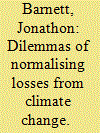

|
|
|
|
|
| Summary/Abstract |
The idea that climate change may cause the loss of atoll countries is now taken for granted in much of climate change science, policy and media coverage. This normalisation of loss means atoll countries now face a future that is apparently finite, which is a grievous situation no other country has to contend with. This paper explains the dilemmas this presents to atoll countries. If there is a risk of forced migration, then strategic planning can minimise its social impacts. Yet, doing so may bring future dangers into the present by undermining efforts to facilitate adaptation to climate change, creating new identities and deterring investments in sustainable resource management. To overcome this dilemma, the paper argues for a more hopeful approach to the future of atoll countries, because for as long as the science of loss remains uncertain, and the limits to adaptation are unknown, forced migration cannot be taken as a matter of fact and could possibly be averted through emission reductions and a vastly improved and significantly more creative approach to adaptation.
|
|
|
|
|
|
|
|
|
|
|
|
|
|
|
|
| 3 |
ID:
097744
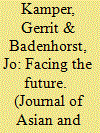

|
|
|
|
|
| Publication |
2010.
|
| Summary/Abstract |
This study focuses on the impact of social change on the black youth of post-apartheid South Africa. It is argued that adolescents' perspectives on their future in this country are of particular relevance due to the extent of social problems which are currently experienced in South Africa. With South Africa's history of apartheid and discrimination, it emerges that the influence of traditional cultural norms and values on the black youth is slowly but surely diminishing. They tend to share the general consumerism of South Africa's wealthy classes, and many lack the history of participation in the struggle for political freedom. Amidst severe social problems, such as poverty, unemployment, HIV/AIDS and violent crime, the findings of an empirical investigation into the views of 391 black adolescents from a variety of socio-economic backgrounds indicate that a general spirit of optimism and independence exists, paired with a strong desire to escape the trappings of poverty and the inferiority of the past.
|
|
|
|
|
|
|
|
|
|
|
|
|
|
|
|
| 4 |
ID:
097674


|
|
|
| 5 |
ID:
119754
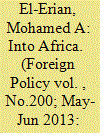

|
|
|
| 6 |
ID:
119912


|
|
|
|
|
| Publication |
2012.
|
| Summary/Abstract |
In a recent article in Time, former United States president Bill Clinton lists five global phenomena as cause for optimism, beginning with the assertion that "phones mean freedom." Clinton explains that mobile phones "foster equality" and have "revolutionized the average person's access to financial opportunity," citing a 2010 UN study that found that mobile phones are "one of the most effective advancements in history to lift people out of poverty." To expand on Clinton's important observations, it is notable that the device that "fosters equality" and "lift[s] people out of poverty" is by and large provided by entrepreneurs and businesses seeking to make a profit.
|
|
|
|
|
|
|
|
|
|
|
|
|
|
|
|
| 7 |
ID:
168706


|
|
|
| 8 |
ID:
103086


|
|
|
| 9 |
ID:
137639
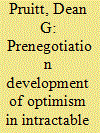

|
|
|
|
|
| Summary/Abstract |
Except when there is substantial third-party pressure for settlement, participants in intractable conflict will only enter negotiation if they are motivated to end the conflict and optimistic about negotiation’s chances of success. The sources of such optimism are explored using case material from three intractable interethnic conflicts that were ultimately resolved by negotiation. In all three cases, optimism developed during prenegotiation communication between the parties. Also there were two main channels of communication, each channel providing credibility to the other and serving as a back-up if the other failed. In two of the cases the communication was face-to-face and friendly, but in the third it was distant and mediated by a chain of two intermediaries. A possible reason for this difference is that the parties were positively interdependent in the first two cases but not in the third. The paper concludes with a summary of three psychological experiments that demonstrate the impact of positive vs. negative interdependence.
|
|
|
|
|
|
|
|
|
|
|
|
|
|
|
|
| 10 |
ID:
125208
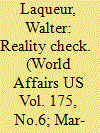

|
|
|
|
|
| Publication |
2013.
|
| Summary/Abstract |
Psychological factors have always played a decisive role in the assessment of political trends. Yet until recently they have not been analyzed. Now neuroscientists (rather than political scientists) are talking about optimism and pessimism bias. According to their findings, most people tend to see the political glass as at least half full. As Tali Sharot writes in her recent book The Optimism Bias, "A growing body of scientific evidence points to the conclusion that optimism may be hardwired to the human brain." Another school of cognitive scientists sees the main danger in being too much influenced by negative conclusions when faced by ambiguous social and political situations. In the words of a recent issue of American Scientist devoted to the subject of optimism and pessimism, "A negative bias can construct a more hostile worldview than if a person's focus tends to lands of friendly faces."
|
|
|
|
|
|
|
|
|
|
|
|
|
|
|
|
| 11 |
ID:
118604


|
|
|
|
|
| Publication |
2012.
|
| Summary/Abstract |
The recent long-awaited change in government in Georgia has sparked a debate among political observers about how the October 2012 election will affect Russian-Georgian relations. The negative impact will be negligible because bilateral relations cannot get any worse than they already are. We can look towards the future with a small degree of cautious optimism. After all, a dream - whether in Georgia or somewhere else - is only a dream, not a plan of action. There are promises and expectations in both Russia and Georgia, and Georgians want change. However, the reality may be a far cry from promises and expectations.
|
|
|
|
|
|
|
|
|
|
|
|
|
|
|
|
| 12 |
ID:
173806


|
|
|
|
|
| Summary/Abstract |
When and why might a rising China challenge the power and security of a relatively declining United States? Conventional wisdom argues that China – like other rising states – is apt to adopt an increasingly ambitious strategy that imperils US interests as its relative power grows. Drawing on balance of power theory, I instead argue that the threat of Chinese predation is overstated. Rising in a crowded geopolitical neighbourhood, China faces incentives to avoid preying on the United States, and may even have reason to cooperate with the United States over the long term.
|
|
|
|
|
|
|
|
|
|
|
|
|
|
|
|
| 13 |
ID:
119761
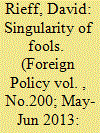

|
|
|
| 14 |
ID:
100771


|
|
|
|
|
| Publication |
2010.
|
| Summary/Abstract |
Interest in deliberative theories of democracy has grown tremendously among political theorists, political scientists, activists, and even government officials. Many scholars, however, are skeptical that it is a practically viable theory, even on its own terms. They argue (inter alia) that most people dislike politics and that deliberative initiatives would amount to a paternalistic imposition. Using two large national samples investigating people's hypothetical willingness to deliberate and their actual participation in response to a real invitation to deliberate with their member of Congress, we find that (1) willingness to deliberate in the United States is much more widespread than expected, and (2) it is precisely those people less likely to participate in traditional partisan politics who are most interested in deliberative participation. They are attracted to such participation as a partial alternative to "politics as usual."
|
|
|
|
|
|
|
|
|
|
|
|
|
|
|
|
| 15 |
ID:
181942


|
|
|
|
|
| Summary/Abstract |
The field of international relations has been described as a discipline rooted in pessimism. This stems from misunderstanding optimism and from downplaying the negative consequences of pessimism. Insights from the psychological literature on optimism challenge these assumptions. In particular, the optimism-pessimism binary needs to be broken down and optimism seen as a healthy middle state between overconfident risk-taking and debilitating pessimism. There are proven techniques that could be used by those working in international relations to promote an optimistic outlook to help avoid falling into despondency. The field will limit the ability of its scholars, practitioners and students to contribute to solving problems if it ties itself to pessimism.
|
|
|
|
|
|
|
|
|
|
|
|
|
|
|
|